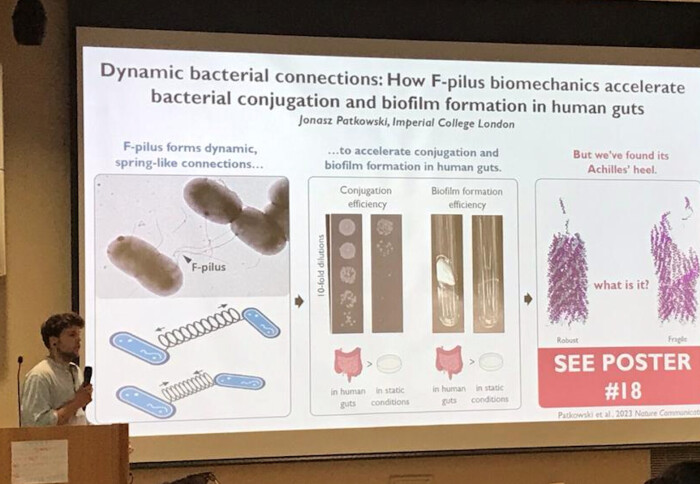Life Sciences funds travel awards for young scientists
by Emily Govan

Life Sciences has allocated funds to support travel awards for young scientists to give them the opportunity of presenting their work further afield.
The department has allocated funds to support travel awards for postdoctoral research associates, research fellows and PhD students for the purpose of presenting at conferences or attending scientific workshops. The scheme forms part of the departmental Athena SWAN action plan. Below are some examples of how students used their awards this year to progress their careers.
Marine Secchi , PhD Student
Marine Secchi, a PhD student supervised by Professor Cristina Lo Celso, received a travel award of £500 to take part in the annual International Society for Experimental Haematology meeting in NYC.
 Marine said: ‘There were exciting scientific talks from some of the big names in the field, whose papers I've been reading since I started my PhD. Equally exciting was the opportunity to meet other trainees from labs from all over the world. Postdocs and junior PIs were very open to sharing their experience on their scientific journeys and gave me helpful tips. I had many very interesting discussions during the 2 poster sessions where I presented and found at that one part of my PhD project is actually more in trend than I expected! It was very motivating to experience the friendliness of researchers in the field and to hear about so many new technologies and research avenues’.
Marine said: ‘There were exciting scientific talks from some of the big names in the field, whose papers I've been reading since I started my PhD. Equally exciting was the opportunity to meet other trainees from labs from all over the world. Postdocs and junior PIs were very open to sharing their experience on their scientific journeys and gave me helpful tips. I had many very interesting discussions during the 2 poster sessions where I presented and found at that one part of my PhD project is actually more in trend than I expected! It was very motivating to experience the friendliness of researchers in the field and to hear about so many new technologies and research avenues’.
Jonasz Patkowski, PhD student
Jonasz Patkowski, a third-year PhD student from the Tiago Costa Laboratory at CBRB, presented his poster titled ‘Dynamic bacterial connections: How F-pilus biomechanics accelerate bacterial conjugation and biofilm formation in human guts’ at the 2023 Gordon Research Conference and Seminar Microbial Adhesion and Signal Transduction in Newport, Rhode Island. His poster about bacterial conjugation – the main driver of the spread of antibiotic resistance in humans – documents how the precise structural properties of the conjugative F-pilus, such as high elasticity, robustness, and presence of phospholipids in its atomic structure, accelerate the rates at which conjugation and biofilm formation occur in turbulent environments, such as in the human guts.
Jonasz said: ‘Visiting America for the first time in my life and sharing my research with an international audience of world-renowned scientists was possible thanks to the support from my supervisor – Tiago - and the generous DoLS Travel Award that I was granted by the Department’.
"We are proud to announce that the travel awards have been extended to cover caring costs - We are excited by this development and hope this will better support early-career researchers and their dependents. Dr Josh Hodge Chair, Life Sciences EDI Committee
Dr Josh Hodge, Chair of the Equality, Diversity and Inclusion Committee for Life Sciences, said: ‘Recipients of the travel award are asked to write a short piece on their experiences and it’s encouraging to read how the fund has added value to their research and careers. We are proud to announce that the awards have now been extended to cover caring costs to alleviate the financial constraints parents/carers face when making the decision to the attend conferences and events. We are excited by this development and hope this will better support early-career researchers and their dependents.’
Find out more about the Travel Awards scheme.
Article text (excluding photos or graphics) © Imperial College London.
Photos and graphics subject to third party copyright used with permission or © Imperial College London.
Reporter
Emily Govan
Department of Life Sciences